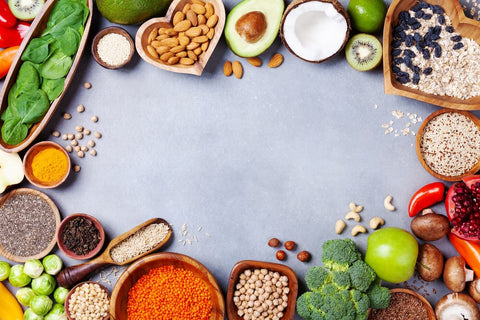What is a "superfood?" The term is used to describe foods that are thought to be nutritionally dense and thus good for one's health. Examples of superfoods include blueberries, salmon, kale and acai. However, there are no set criteria for determining what is and what is not a superfood. According to the American Heart Association,"Superfoods don't have their own food group." As a dietician, I think "superfood" should be re-defined as any healthy whole food which offers significant nutritional value per calorie (i.e., more than 12%).
The Nutritional Power of Superfoods
- Blueberries are a good source of soluble fiber and also high in vitamin C. Research has shown that eating blueberries can improve memory and reduce the risk of cancer and heart disease. As a bonus, they taste really great!
- Salmon is rich in omega-three fatty acids (which reduces inflammation), selenium (which protects against cancer, heart disease and type-II diabetes), vitamin D (a bone health nutrient) and B vitamins.
- Kale is high in iron, calcium, Vitamins A & C as well as dietary fiber. It also has more protein per calorie than spinach!
- Acai berries are a good source of antioxidants and also high in fiber, vitamins C & E.
Superfoods and Mental Health
One of the benefits of a diet rich in these foods is that it can help to keep depression at bay because they are good sources of serotonin. Serotonin is one neurotransmitter that helps regulate moods as well as plays an important role in sleep regulation. Research has confirmed that people who eat a diet high in these foods are at lower risk for depression.
The Role of Processed Superfoods
Preserved or processed forms of superfoods, such as dried blueberries, kale chips, and kiwi fruit, retain much of their nutrient content, making them convenient options for a healthy diet. Interestingly, some research suggests that certain processed foods, like chicken, may even surpass traditional sources, such as fish, in omega-3 fatty acid content.
The Superfood Dilemma: No Set Criteria
Despite the popularity of the term, there is no official classification for what makes a food a "superfood." As a dietitian, I believe the term should refer to any whole food that offers significant nutritional value per calorie—specifically, more than 12%. However, the American Heart Association notes that "superfoods don't have their own food group." Instead, the term is often used to describe foods that are densely packed with nutrients and offer unique health benefits not commonly found in other traditional food sources.
The Powerhouse Foods
Avocados have been shown to help lower cholesterol levels with their potassium content while also being low-calorie (great for weight loss) and nutrient dense as well as containing high levels of fiber. So while there may be foods that are higher in nutrients and healthier than others, they don't have specific qualities that make them "superfoods." Once you've chosen your powerhouse foods to include on a diet or healthy eating plan, it's important to consume enough protein and essential fats found in these proteins to help maintain a healthy weight.

What exactly is a "superfood?"
In general, it's food that has special health benefits beyond the typical nutritional value of its ingredients and nutrients. Experts say superfoods can help with weight loss, prevent heart disease, reduce cancer risk, lower blood pressure--the list goes on. Furthermore, some research shows that certain superfoods have anti-inflammatory properties. Others contain antioxidants and vitamin C--which in turn can help reduce stress levels, prevent colds and other illnesses.
Exploring the Benefits of Super VORG Superfood Shakes
The exceptional nutrient density provided by superfoods has been shown to naturally aid the body’s functions and defenses. Incorporating superfoods into your diet through products like Super VORG shakes can promote mental clarity, boost immunity, improve heart health, and even reduce the effects of aging. These shakes consist of a wide range of ingredients classified as “super,” such as amla, chia seeds, and barley. Just one tablespoon of Super VORG superfood shake delivers the equivalent nutrients of three cups of vegetables!
Why Choose Super VORG Shakes?
Super VORG superfood shakes are designed to provide a convenient and effective way to incorporate superfoods into your daily routine. These shakes are:
- Gluten-Free and Vegan: Ideal for individuals with dietary restrictions or allergies.
- Sugar-Free: Perfect for those looking to avoid blood sugar spikes, unlike sugary cereals or snacks.
- Nutrient-Dense: Each scoop delivers a powerful dose of vitamins, minerals, and antioxidants.
Conclusion: The Value of Superfoods
Superfoods offer exceptional health benefits by delivering high levels of nutrients with fewer calories. While the term "superfood" may lack a formal definition, the health benefits of these nutrient-rich foods are undeniable. Incorporating superfoods into your diet, particularly through convenient options like Super VORG shakes, can help you achieve a balanced and healthful lifestyle.
FAQs About Superfoods
What defines a superfood?
A superfood is generally any food that is highly nutrient-dense and offers significant health benefits beyond its basic nutritional value.
Are processed superfoods still healthy?
Yes, many processed superfoods like dried blueberries or kale chips retain their nutrients and can be a convenient, healthy option.
How do superfoods support mental health?
Superfoods rich in vitamins, minerals, and antioxidants can support serotonin production, which helps regulate mood and reduce the risk of depression.
Is there a formal list of superfoods?
No, there is no official list or classification for superfoods, but foods like avocados, quinoa, and blueberries are commonly recognized for their exceptional health benefits.
Can superfoods help with weight loss?
Yes, many superfoods are high in fiber and protein, which can help you feel full longer and support healthy weight loss.
Are superfoods safe for everyone?
Most superfoods are safe for general consumption, but individuals with specific allergies or health conditions should consult a healthcare provider before adding new foods to their diet.





